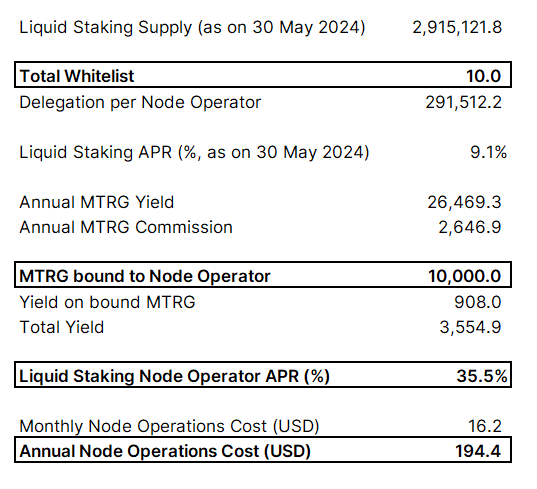Introduction
Dear Community,
This proposal aims to decentralize liquid staking on the Meter network by expanding the validator set supporting the liquid staking registry. Presently, only the Meter Foundation Node is part of the liquid staking validator registry. Expanding this set will enhance the network’s security, performance, and decentralization.
Background
Liquid staking pools face two significant challenges:
- Providing a Liquid Staking Token: Ensuring that the staking token (stMTRG) is useful and deeply liquid.
- Maintaining a Quality Validator Set: Maximizing APR for users while minimizing the risk of misbehavior or poor performance for the blockchain.
Decentralized liquid staking operators reduce risks for stakers and mitigate potential negative effects on integrated DeFi protocols and the underlying network with minimal risk of downtime or censorship, while maintaining high throughput. This necessitates validators that are censorship-resistant and perform well under all conditions.
Proposal Details
The overall details of the proposal are as below;
-
Whitelist:
a. Number of Validators: 10
b. Preference: 50% professional services, 50% community members (community members with active contributions to the ecosystem will get a priority) -
Process:
a. Vote Distribution: Equal across all validators -
Minimum Stake:
a. 10,000 MTRG -
Specifications:
a. Minimum Hardware Requirements: 4 Core CPU, 16 GB RAM, 200 GB NVMe storage
b. Restrictions: Avoid unstable VPS providers like Contabo -
Communications:
a. Direct communication with the team for upgrade, bailout within 24 hours -
Expulsion Policy:
a. Automatic if node is not bailed out within 24 hours
The goal is to minimize risks associated with operator compromise, network connectivity issues, and operator misconfiguration by creating a diverse and robust validator set with the following properties:
- Legal and physical independence of node operators
- Jurisdictional distribution of operators
- Geographical distribution of validators
- Diverse infrastructure:
- Avoidance of overreliance on specific cloud providers and data centers
- Adherence to best practices for securing execution and consensus layer nodes, as well as validator clients
- Strong key management and security practices
Further expansion of Validator Registry
We will review the response to the initial whitelist and operational efficacy for a minimum of 2 months before expanding the validator registry further.
Potential Returns
The potential returns for the initial whitelist of 10 Validators are;
The APR will vary based on number of Validators and MTRG bounded in liquid staking.
The Node operations cost is estimated based on below Netcup server.
Application Process
Interested users and entities should fill out the Google form - Meter Liquid Staking Validator Registration.
The application includes:
- Node Operator: Individual or Entity
- Previous Node Operation Experience: Yes/No
- Experience Details:
- Node Operation Infrastructure: On-premise or Cloud VPS
- If Cloud VPS, specify provider
- Contact Information
Applications will be evaluated by the Meter Foundation, which will finalize professional services for node operations. If community applications exceed the available whitelist spots, community members with active contributions to the ecosystem will get a priority.
Benefits to Meter Ecosystem
A more diverse and secure node operator set will benefit stakers by distributing their deposits across a greater number of independent entities. This mitigates network downtime risk and enhances the resilience of the Meter network.
Governance and Voting Process
Forum Discussion
Period of 7 days starting 31 May 2024 00:00 UTC until 6 June 2024 00:00 UTC.
Governance Proposal Voting
Period of 2 days starting 7 June 2024 00:00 UTC to 9 June 2024 00:00 UTC.
Users can vote with MTRG, staked MTRG, stMTRG and wstMTRG along with MTRG/ wstMTRG supplied in Sumer and Meridian and MTRG-wstMTRG liquidity on Symmetric. The proposal will pass when it achieves a majority vote. There is no quorum requirement.
